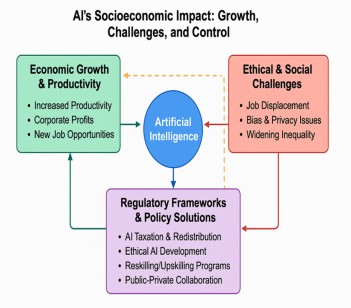Research Article | Open Access
|
Open Access
|


 | Published online: 17 June 2025
The Socioeconomic Impact of Artificial Intelligence: Profit-Driven Growth and the Struggle for
Control
| Published online: 17 June 2025
The Socioeconomic Impact of Artificial Intelligence: Profit-Driven Growth and the Struggle for
Control
Mohd Shafi Pathan* and Shivraj Patare*
Department of Computer Science and Information Technology, MIT Art Design and Technology University, Pune, Maharashtra, 412201, India
*Email: shafi.pathan@mituniversity.edu.in; shivrajpatare.work@gmail.com
J. Collect. Sci. Sustain., 2025, 1(1), 25402 https://doi.org/10.64189/css.25402
Received: 10 May 2025; Revised: 28 May 2025; Accepted: 12 June 2025.
Abstract
Artificial Intelligence (AI) has emerged as a transformative force driving economic expansion and innovation across industries. As organizations race to adopt AI for productivity gains, cost efficiency, and market dominance, the resulting growth has become increasingly profit-driven. However, this unregulated pursuit of technological advancement brings with it significant societal, ethical, and policy-related challenges. This research paper explores the dual nature of AI's socioeconomic impact—one marked by economic acceleration and the other by widening inequality, job displacement, and a struggle for control between corporate powerhouses and governing institutions. The core problem addressed is the lack of comprehensive governance mechanisms to balance economic incentives with the ethical and equitable deployment of AI. While AI promises significant benefits such as automation, predictive analytics, and enhanced decision-making, it also risks marginalizing underrepresented communities and concentrating power among a few technology monopolies. Our research proposes a balanced methodology: combining a literature review, comparative analysis of existing regulatory efforts, and the development of a conceptual framework integrating socio-technical ethics with economic policy. Through an architectural diagram, system design flowchart, and policy-oriented algorithm, the study outlines actionable recommendations. These include progressive AI taxation, reskilling initiatives, equitable data governance, and collaborative public-private AI governance models. By benchmarking across multiple metrics such as economic inclusivity, transparency, and scalability, the paper presents a comparative analysis of current approaches and highlights their limitations. Ultimately, the research concludes that while AI can significantly enhance socioeconomic systems, sustainable progress will only be achieved through ethical oversight and inclusive regulatory frameworks. Governments, academia, and the private sector must collaborate to redirect AI’s trajectory from unchecked profit-driven growth toward a balanced, inclusive, and equitable digital future.
Graphical Abstract
Novelty statement
The study explores the dual nature of AI's socioeconomic impact—one marked by economic acceleration and the other by widening inequality.






